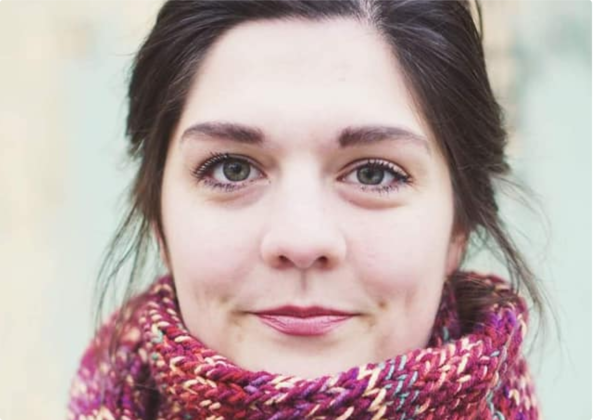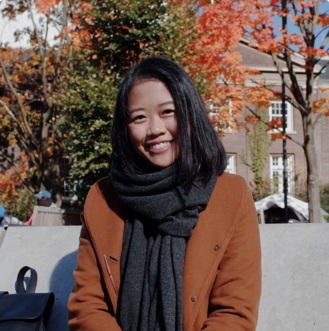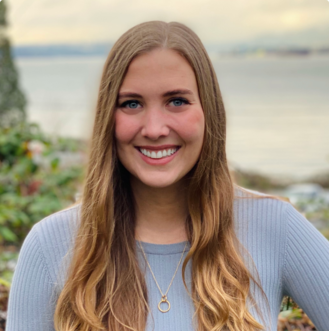Student Profile
Amy Henderson
Content Designer at Addepar
Course Taken
UX Design Course
Key Skills Learned
- User Research
- Sketching and Wireframing
- Prototyping

Interview
Where are you currently working and what is it that you do there?
I work at Addepar, as a Content Designer.
Can you tell us a bit more about what your day-to-day is like as a UX Writer?
In my day-to-day, I tend to work with teams – sometimes it’s just a Designer and myself, sometimes I work with Writers, Designers, Product, Developers, etc. There is a lot of collaboration between our roles for this process, and that’s why I took the UX Design Certificate Course at BrainStation.
Work-wise, as a Content Designer I like to say I design words. A lot of people think a UX Writer is just like a Copywriter, but they are very different roles. UX Writers are more like Writers, Strategists, and Designers, all wrapped up into one creative role – you need to know how everything works.
My work entails an understanding of common language, brand voice, competitors, consumer behavior and expectations, and design principles. The question I’m always asking is, “can this experience be understood in three seconds or less?” I look at things like alliteration and the appearance of words; how does it look if the words are stacked? What do you do if it wraps? In the end, it’s all about developing brand trust and providing a frictionless, accessible experience.
Can you tell us a bit more about your career and education background?
My background is pretty interesting. When I was 18, I wanted to be on Broadway – I trained in classical, jazz, and musical voice for 8 years. Nearing the end of my studies I moved to France to finish my degree in French and Music, then moved to the Alps and worked as a middle school English Teacher. There, I was inspired by the culture and wrote my first book (unpublished), wrote an album, and performed with some local musicians.
When that opportunity wrapped up, I went back to the US and worked in nonprofits where I started acquiring more professional skills. Throughout college, I had studied program design and strategy for nonprofits, so this allowed me to begin designing and developing programs for nonprofit organizations. I wrote all the documentation, prepped the copy, designed the system, and essentially built the machine – then I’d give it back to them. I did that for a while until I was hired by a creative co-working space that introduced me to a whole new world of work. I ended up designing education programming, business incubator programming, and the start of a sustainability program for Freelancers.
I was exposed to UX for the first time at that co-working space because there was a UX design agency based there. A Designer friend of mine was able to pull me into a project as a UX Writer and that’s how I got my first taste. I remember asking, “how does a Writer become a UX Writer?” She replied, “I don’t know – just put the letters UX in front of Writer and learn about it.” As a scrappy non-profit professional I started doing UX, and found whatever opportunities I could to practice and improve.
I was a beginner in the field, and while I’d freelanced in UX design and UX writing, I needed a bit more support. Because the pandemic had caused me to lose a lot of my work, I decided now was the time that I needed to make a move. That’s when I decided to sign up for the UX Design course at BrainStation.
What made you decide to take a course at BrainStation?
I was a beginner in the field, and while I’d freelanced in UX design and UX writing, I needed a bit more support. Because the pandemic had caused me to lose a lot of my work, I decided now was the time that I needed to make a move. That’s when I decided to sign up for the UX Design course at BrainStation. I talked to my friends who work in UX, as well as my UX mentor, and I showed them BrainStation and a couple of competitors. My mentor noticed that BrainStation covered most of what I needed to know to get started in the field. That’s also when I saw that BrainStation had a scholarship for women in technology, and that helped me afford the course.
How did the Women in Technology Scholarship impact your professional development?
Without it, I wouldn't have been able to enroll and I probably wouldn't have gotten the job I have now. It also gave me the confidence knowing that BrainStation cares about women in technology, and it really made me care more about BrainStation as a whole. I got a job a month after I finished my class, and I kept thinking to myself “wow, I can’t believe it worked.” Looking back though, I did the work. I freelanced, built up my portfolio, applied for at least 30 positions, and eventually got the call. I’m really grateful.
What would you say was the highlight of the learning experience at BrainStation?
Definitely the Instructors. Their feedback, investment in the content, and industry experience really added to the course.
I find it very rare in educational institutions when Instructors are actually still working in the industry. I was so happy that I could ask questions and get realistic answers. They also helped break down what the most important concepts were to know throughout all the content, making sure we really focused on what mattered. That was so helpful.
You should know I came back to take a second class! I'm actually currently taking your product management class.
I find it very rare in educational institutions when Instructors are actually still working in the industry. I was so happy that I could ask questions and get realistic answers. They also helped break down what the most important concepts were to know throughout all the content, making sure we really focused on what mattered. That was so helpful.
Can you talk a bit more about the projects that you worked on? How did that impact your learning experience and the work that you do now?
After taking the course, I didn’t think that I wanted to be a Designer. And it wasn't because I didn't like it – it's because the class was enough to show me that I wasn't ready to become a UX Designer. Maybe that's just me being tough on myself, but I know what I'm good at and when I’m not good at something. I'm a very good Strategist and a strong Writer. I was not a very good Designer at the time, but the project helped me learn a lot. I even ended up even getting a side UX design gig in addition to the project during the course which was very helpful.
I’m also taking the product management course which is currently helping me in my workplace. It informs me a lot about how internal systems work, what affects my capacity, how I can leverage information, and how I can communicate better with people in different roles by understanding the appropriate jargon.
What would you say are the most valuable skills that you picked up from the UX Design and Product Management courses?
From my UX design course, I’d say learning how to design was the most valuable. Second to that is more of the why, why it matters.
With product management, I'm learning more about how to strategize on a business level. It’s really helping me internally, and it's been improving my communication with stakeholders exponentially. Working in the tech industry I found these courses essential to the understanding of my workplace. There's definitely benefits of taking a course before you get a job in tech and then also while you’re in the industry.
What was the job search experience like after BrainStation?
It was hard, especially with the pandemic. But I put myself in a situation where opportunities would present themselves. Taking the UX design course, for example, gave me the validation to know that I can actually do the work. It was a big financial undertaking, but I knew that if I got a job from the class, I would be able to pay it off in less than a month – and that was enough motivation for me.
After I had built out my portfolio, I started applying to jobs and working with a Recruiter. And what happened was, a different unrelated Recruiter reached out to me on LinkedIn looking for a UX Writer position for Macy’s. I ended up having an interview a week later and was hired shortly after. I think that experience is pretty rare. After about a year, I went on to work at Addepar, as a Content Designer.
Was this your first online learning experience? What were your thoughts about the online learning environment?
I had my first online class in college actually. There was no live video with that class though, it was about reading the content on your own time and sending in your report. I also taught English online before BrainStation. The BrainStation course was a really different learning environment – I felt really satisfied.
I was very impressed with BrainStation's efforts to connect students in breakout rooms and ensuring they were engaged by asking interesting questions. They got the students excited to talk about the design field. Unless you have friends that work in tech, it's not something people tend to talk a lot about.
What advice would you give to other professionals that are out there that are maybe considering a BrainStation course or bootcamp?
Use the course as a tool to set yourself up for success. Create a portfolio, get some freelance gigs or some sort of industry experience, and apply.
Talk to your friends and connections with people from different areas, and see what opportunities you can manifest for yourself. Also, be open to things that you might not have expected! Taking the course allowed me to realize I’m a UX Writer and that there's work in that space. The UX Design Certificate course is what gave me a unique advantage. Overall, genuinely, good luck to anyone switching into UX – I feel like I finally found my career.
Get Started
Ready to Become the Next Success Story?
Join a network of over 250,000 professionals who are transforming and accelerating their careers through cutting edge tech skills.
- Discover new courses and programs
- Learn about tuition, payment plans, and scholarships
- Get access to VIP events and workshops


